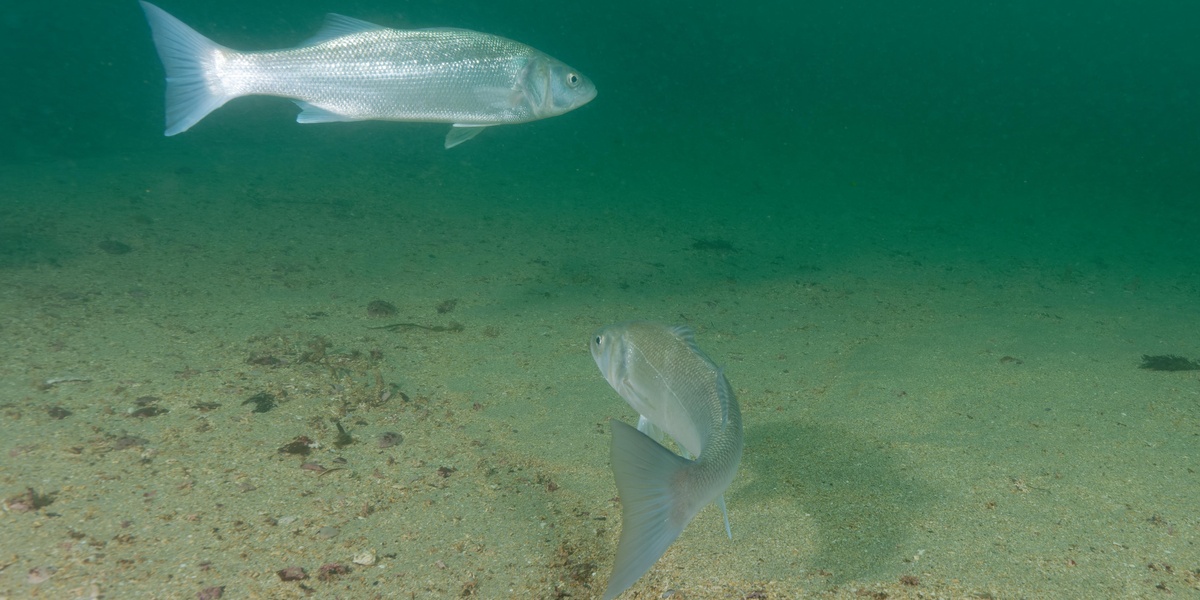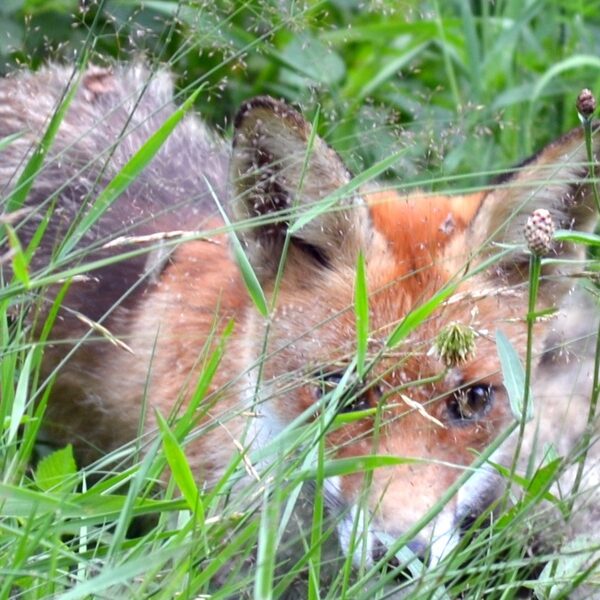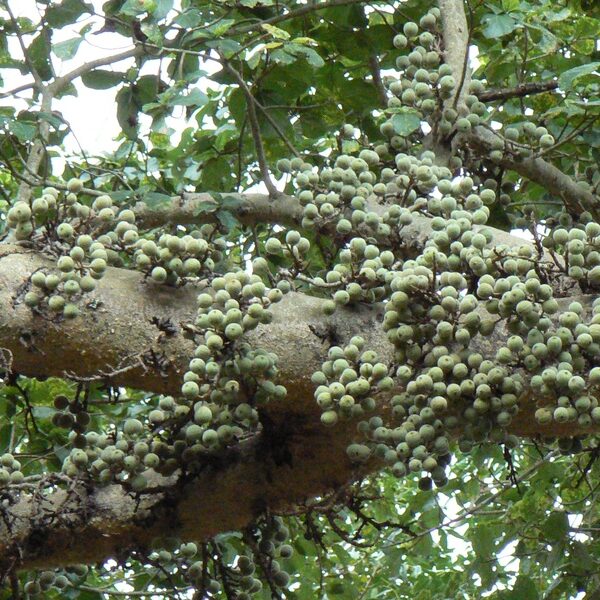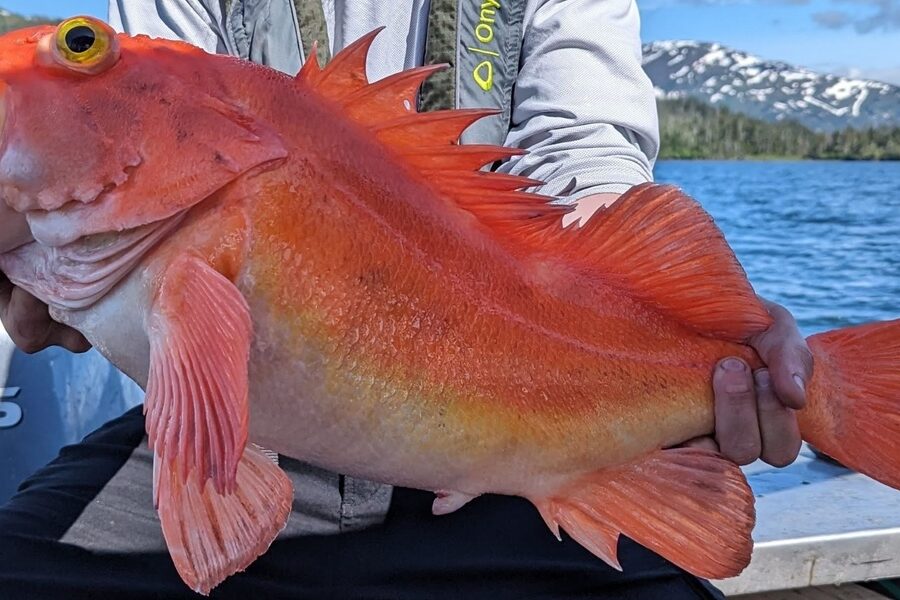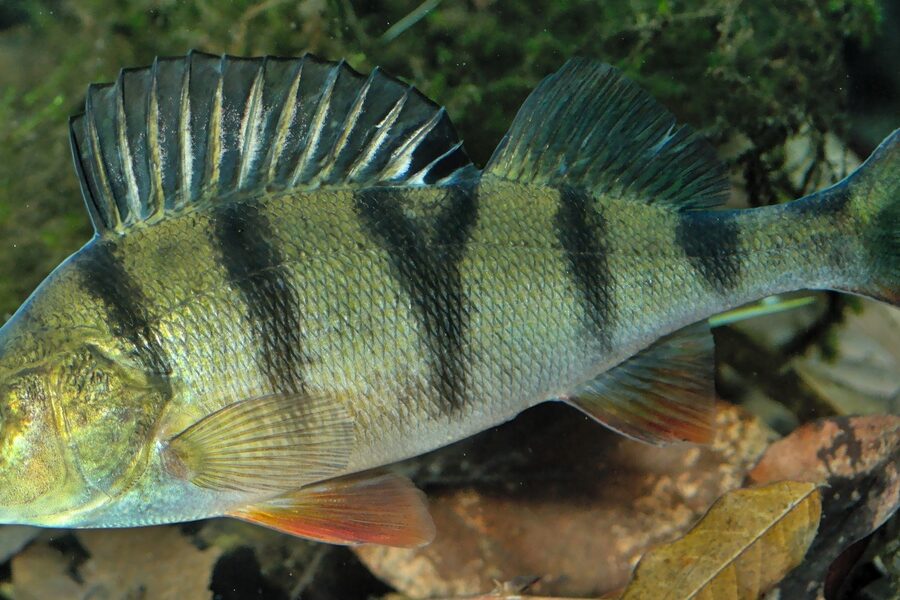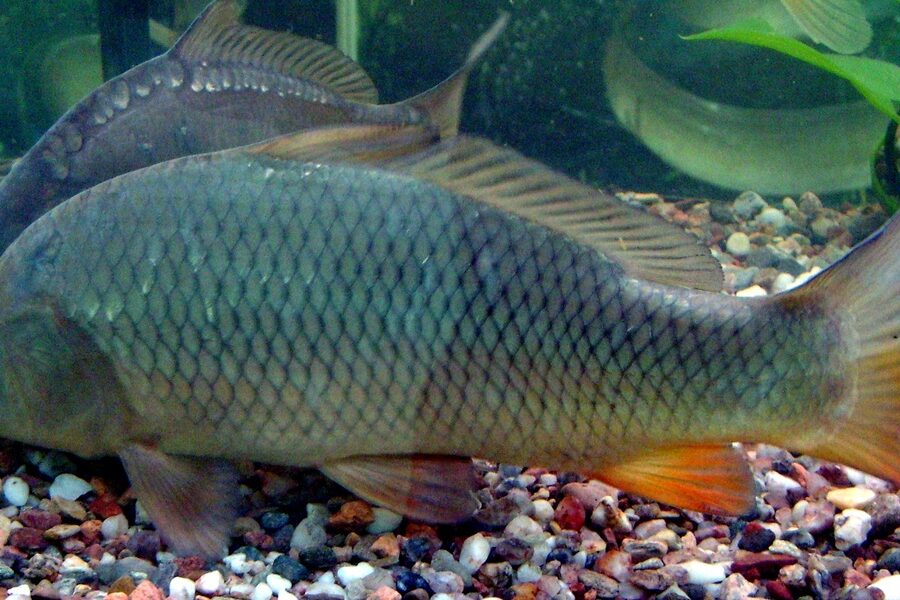Croatia’s long Adriatic coastline, dotted with islands, bays and karst rivers, supports a mix of marine and freshwater species that interest anglers, divers and naturalists alike. From coastal reefs to limestone streams, the country’s varied habitats create plenty of places to spot different fish.
There are 98 Fish of Croatia, ranging from Adriatic Salmon to Zrmanja Chub. For each species the entry shows Scientific name,Max length (cm),Habitat & range — you’ll find below.
What details does each entry include and how do they help me identify a species?
Each entry lists the common name plus the Scientific name, Max length (cm) and Habitat & range so you can cross-check identification, understand expected size and learn where the species is typically found.
Do I need permits or seasonal information to observe or fish these species in Croatia?
Regulations vary by species, location and activity: recreational fishing, protected species and marine reserves have different rules, so check local authorities, park guidelines and seasonal restrictions before planning trips and respect catch limits and protected-area rules.
Fish of Croatia
| Common name | Scientific name | Max length (cm) | Habitat & range |
|---|---|---|---|
| Gilt-head Bream | Sparus aurata | 70 | Adriatic Sea; coastal waters, seagrass beds, sandy bottoms |
| European Sea Bass | Dicentrarchus labrax | 103 | Adriatic Sea; coastal waters, estuaries, river mouths |
| Common Dentex | Dentex dentex | 100 | Adriatic Sea; rocky reefs and offshore banks |
| Red Scorpionfish | Scorpaena scrofa | 50 | Adriatic Sea; rocky, sandy, or muddy bottoms |
| John Dory | Zeus faber | 66 | Adriatic Sea; demersal on soft bottoms, seagrass beds |
| Dusky Grouper | Epinephelus marginatus | 150 | Adriatic Sea; rocky reefs, caves, and wrecks |
| Greater Amberjack | Seriola dumerili | 190 | Adriatic Sea; pelagic, often near reefs and drop-offs |
| Atlantic Bluefin Tuna | Thunnus thynnus | 458 | Adriatic Sea; pelagic, open-ocean migrant |
| Moray Eel | Muraena helena | 150 | Adriatic Sea; rocky reefs, crevices, and caves |
| European Pilchard | Sardina pilchardus | 27.5 | Adriatic Sea; coastal pelagic schools |
| European Anchovy | Engraulis encrasicolus | 20 | Adriatic Sea; pelagic, forms large schools |
| Common Pandora | Pagellus erythrinus | 60 | Adriatic Sea; various bottoms, especially sand and mud |
| Salema Porgy | Sarpa salpa | 51 | Adriatic Sea; rocky shores and seagrass meadows |
| Peacock Wrasse | Symphodus tinca | 44 | Adriatic Sea; shallow coastal waters, seagrass beds |
| Ornate Wrasse | Thalassoma pavo | 25 | Adriatic Sea; rocky shores and seagrass beds |
| Greater Weever | Trachinus draco | 53 | Adriatic Sea; sandy and muddy bottoms |
| White Seabream | Diplodus sargus sargus | 45 | Adriatic Sea; rocky bottoms and seagrass beds |
| Saddled Seabream | Oblada melanura | 34 | Adriatic Sea; rocky shores and seagrass beds |
| Forkbeard | Phycis phycis | 65 | Adriatic Sea; rocky bottoms, caves, and wrecks |
| European Hake | Merluccius merluccius | 140 | Adriatic Sea; deep continental shelf and slope |
| Monkfish | Lophius piscatorius | 200 | Adriatic Sea; sandy and muddy seabed |
| Turbot | Scophthalmus maximus | 100 | Adriatic Sea; sandy and muddy bottoms |
| Common Sole | Solea solea | 70 | Adriatic Sea; sandy and muddy coastal bottoms |
| Blue Shark | Prionace glauca | 383 | Adriatic Sea; pelagic, open-ocean waters |
| Spiny Dogfish | Squalus acanthias | 160 | Adriatic Sea; demersal, from coast to deep water |
| Thornback Ray | Raja clavata | 105 | Adriatic Sea; sandy and muddy bottoms |
| Mediterranean Rainbow Wrasse | Coris julis | 30 | Adriatic Sea; rocky coasts and seagrass beds |
| Tub Gurnard | Chelidonichthys lucerna | 75 | Adriatic Sea; sandy and muddy bottoms |
| Star-gazer | Uranoscopus scaber | 40 | Adriatic Sea; sandy and muddy bottoms |
| Conger Eel | Conger conger | 300 | Adriatic Sea; rocky bottoms, wrecks, and deep waters |
| Five-spotted Wrasse | Symphodus roissali | 17 | Adriatic Sea; shallow rocky areas and seagrass |
| Axillary Wrasse | Symphodus mediterraneus | 18 | Adriatic Sea; rocky bottoms and seagrass beds |
| Brown Meagre | Sciaena umbra | 70 | Adriatic Sea; caves and rocky overhangs |
| Shi Drum | Umbrina cirrosa | 150 | Adriatic Sea; sandy and muddy bottoms, estuaries |
| Striped Red Mullet | Mullus surmuletus | 40 | Adriatic Sea; sand, gravel, and rock bottoms |
| Leerfish | Lichia amia | 200 | Adriatic Sea; coastal pelagic, estuaries |
| Little Tunny | Euthynnus alletteratus | 122 | Adriatic Sea; pelagic, coastal and offshore waters |
| Garfish | Belone belone | 90 | Adriatic Sea; pelagic, near the surface |
| Horse Mackerel | Trachurus trachurus | 60 | Adriatic Sea; pelagic, often in large schools |
| Grey Mullet | Mugil cephalus | 100 | Adriatic Sea; coastal waters, harbors, estuaries |
| Painted Comber | Serranus scriba | 36 | Adriatic Sea; rocky bottoms and seagrass |
| Brown Comber | Serranus hepatus | 25 | Adriatic Sea; various bottoms, especially Posidonia beds |
| Three-finned Blenny | Tripterygion tripteronotum | 9 | Adriatic Sea; shallow rocky shores |
| Small-spotted Catshark | Scyliorhinus canicula | 100 | Adriatic Sea; sandy and muddy bottoms |
| Smooth-hound | Mustelus mustelus | 164 | Adriatic Sea; coastal waters over continental shelves |
| Eagle Ray | Myliobatis aquila | 183 | Adriatic Sea; coastal sandy and muddy bottoms |
| Brown Trout | Salmo trutta | 140 | Freshwater; cold, clear rivers and streams (e.g., Gacka, Lika) |
| Rainbow Trout | Oncorhynchus mykiss | 120 | Freshwater; introduced in rivers and lakes for sport fishing |
| Grayling | Thymallus thymallus | 60 | Freshwater; clear, fast-flowing rivers (e.g., Kupa, Dobra) |
| Northern Pike | Esox lucius | 150 | Freshwater; lowland rivers and lakes (e.g., Sava, Drava, Vransko Lake) |
| Wels Catfish | Silurus glanis | 500 | Freshwater; large rivers and lakes (Danube, Sava, Drava) |
| Common Carp | Cyprinus carpio | 110 | Freshwater; widespread in lowland rivers and lakes |
| Zander | Sander lucioperca | 100 | Freshwater; large rivers and lakes (Danube, Sava) |
| European Perch | Perca fluviatilis | 60 | Freshwater; rivers, lakes, and ponds throughout Croatia |
| Common Rudd | Scardinius erythrophthalmus | 51 | Freshwater; slow-moving lowland rivers, lakes, ponds |
| Common Bream | Abramis brama | 82 | Freshwater; slow-moving rivers and lakes (Sava, Drava, Kupa) |
| European Chub | Squalius cephalus | 60 | Freshwater; widespread in rivers and lakes |
| Common Nase | Chondrostoma nasus | 50 | Freshwater; fast-flowing rivers in the Danube basin |
| European Eel | Anguilla anguilla | 133 | Freshwater & Adriatic; rivers and estuaries (Neretva, Zrmanja) |
| Pumpkinseed | Lepomis gibbosus | 40 | Freshwater; introduced in ponds, lakes, slow rivers |
| Prussian Carp | Carassius gibelio | 45 | Freshwater; widespread in still and slow-flowing waters |
| Zrmanja Chub | Squalius zrmanjae | 28 | Freshwater; endemic to Zrmanja and Krka river basins |
| Soft-muzzled Trout | Salmo obtusirostris | 70 | Freshwater; endemic to Balkan rivers (e.g., Jadro, Vrljika) |
| Visovac Goby | Knipowitschia mrakovcici | 3.1 | Freshwater; endemic to the Krka river estuary |
| Tuberous Goby | Proterorhinus semilunaris | 11.5 | Freshwater; Danube basin rivers, now spreading |
| Marbled Trout | Salmo marmoratus | 120 | Freshwater; Adriatic basin rivers (e.g., Soča basin parts) |
| Huchen | Hucho hucho | 150 | Freshwater; Danube basin rivers (e.g., Kupa, Sava) |
| Burbot | Lota lota | 152 | Freshwater; cold, deep lakes and rivers (Danube basin) |
| Crucian Carp | Carassius carassius | 64 | Freshwater; ponds, slow rivers, and lakes |
| Dalmatian Barbelgudgeon | Aulopyge huegelii | 20 | Freshwater; endemic to karst fields in Croatia and Bosnia |
| Goldfish | Carassius auratus | 45 | Freshwater; introduced in ponds, lakes |
| Grass Carp | Ctenopharyngodon idella | 150 | Freshwater; introduced in ponds and lakes for weed control |
| Silver Carp | Hypophthalmichthys molitrix | 105 | Freshwater; introduced in Danube basin rivers |
| Bighead Carp | Hypophthalmichthys nobilis | 146 | Freshwater; introduced in Danube basin rivers |
| Sterlet | Acipenser ruthenus | 125 | Freshwater; Danube, Sava, Drava rivers |
| Beluga Sturgeon | Huso huso | 800 | Freshwater; formerly in Danube, Sava, Drava rivers |
| Stone Loach | Barbatula barbatula | 21 | Freshwater; widespread in clear streams and rivers |
| Spined Loach | Cobitis taenia | 13.5 | Freshwater; widespread in sandy bottomed streams and lakes |
| Weatherfish | Misgurnus fossilis | 30 | Freshwater; marshes, ditches, and slow rivers |
| Common Minnow | Phoxinus phoxinus | 14 | Freshwater; widespread in clean, well-oxygenated rivers |
| Gudgeon | Gobio gobio | 20 | Freshwater; widespread in rivers and lakes with sandy bottoms |
| Sunbleak | Leucaspius delineatus | 12 | Freshwater; slow-moving waters, canals, ponds |
| White-finned Gudgeon | Romanogobio vladykovi | 15 | Freshwater; Danube basin rivers with sandy or gravel bottoms |
| Asp | Leuciscus aspius | 120 | Freshwater; large rivers of the Danube basin |
| Ide | Leuciscus idus | 100 | Freshwater; slow-moving lowland rivers (Sava, Drava) |
| Roach | Rutilus rutilus | 50 | Freshwater; widespread in still and slow-flowing waters |
| Blicca | Blicca bjoerkna | 45 | Freshwater; lowland rivers and lakes |
| Vimba Bream | Vimba vimba | 50 | Freshwater; Danube basin rivers |
| Adriatic Salmon | Salmo farioides | 50 | Freshwater; endemic to rivers of the Adriatic basin |
| Swordfish | Xiphias gladius | 455 | Adriatic Sea; pelagic, deep offshore waters |
| Mackerel | Scomber scombrus | 60 | Adriatic Sea; pelagic, often in large schools |
| Horse-eye Jack | Caranx latus | 101 | Adriatic Sea; rare warm-water visitor |
| Barracuda | Sphyraena viridensis | 165 | Adriatic Sea; coastal pelagic, often near reefs |
| Thicklip Grey Mullet | Chelon labrosus | 75 | Adriatic Sea; coastal waters, harbors, estuaries |
| Flathead Grey Mullet | Mugil cephalus | 120 | Adriatic Sea; coastal waters, harbors, estuaries |
| European Flounder | Platichthys flesus | 60 | Adriatic Sea; estuaries, sandy and muddy bottoms |
| Black Goby | Gobius niger | 18 | Adriatic Sea; coastal lagoons, estuaries, and shallow bays |
| Red-mouthed Goby | Gobius cruentatus | 18 | Adriatic Sea; shallow coastal waters, under rocks |
Images and Descriptions
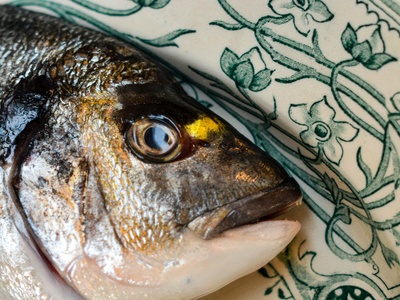
Gilt-head Bream
A prized Mediterranean food fish, easily recognized by the golden band between its eyes. Its powerful jaws crush shells and crustaceans, and it is a popular target for both commercial and recreational fishing in Croatia.
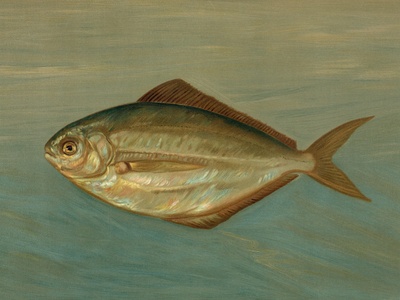
European Sea Bass
A sleek, silver predator known for its delicious white flesh. Highly sought after by anglers and a staple in Croatian coastal cuisine. It is also extensively farmed in the Adriatic, making it widely available.
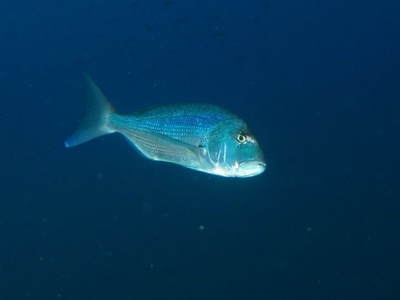
Common Dentex
A powerful predator with prominent canine teeth, giving it its local name ‘zubatac’ (toothy). It is a trophy catch for spearfishers and anglers, revered for its fighting spirit and excellent taste.
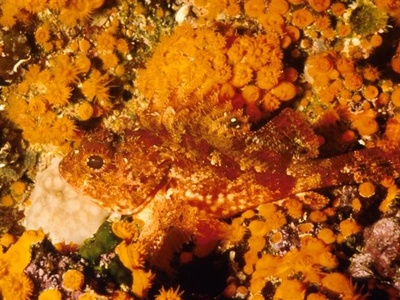
Red Scorpionfish
A master of camouflage with venomous spines, requiring careful handling. Despite its menacing look, its flesh is exceptionally firm and flavorful, a key ingredient in traditional Croatian fish stews (brodet) and soups.
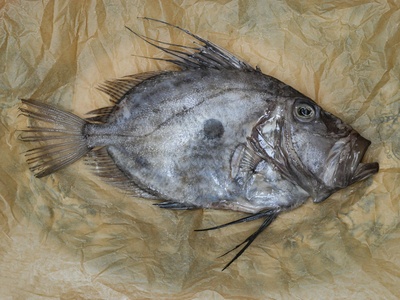
John Dory
An unmistakable fish with a compressed, oval body and a large dark spot on its side. Legend says the spot is St. Peter’s thumbprint. It is considered a gourmet delicacy in Croatian cuisine.
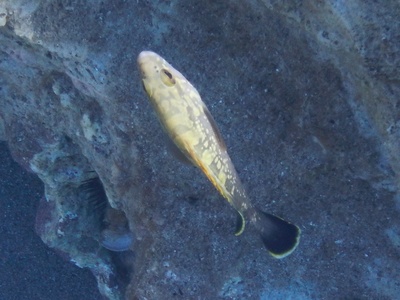
Dusky Grouper
A large, solitary fish, often curious towards divers. Once overfished, it is now a protected species in Croatia, making its sighting a special event for underwater enthusiasts exploring coastal reefs and caves.
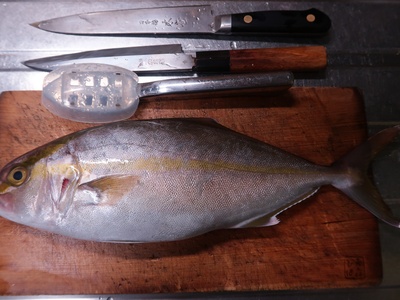
Greater Amberjack
A powerful, fast-swimming predator and a prized game fish known locally as ‘gof’ or ‘orfu’. It is renowned for its strength and is a formidable opponent for sport fishermen in offshore waters.
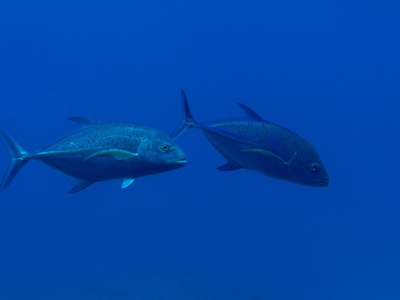
Atlantic Bluefin Tuna
The king of the Adriatic, this magnificent, powerful fish is a warm-blooded predator. Croatia is a key location for its farming and sport fishing, attracting big-game anglers from around the world to its waters.
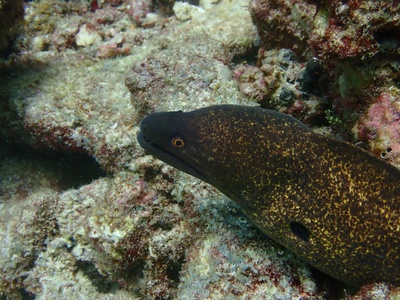
Moray Eel
A snake-like fish often seen peering from its lair. While it looks intimidating with its sharp teeth, it is generally shy unless provoked. Its presence adds a touch of mystery to any Adriatic dive.
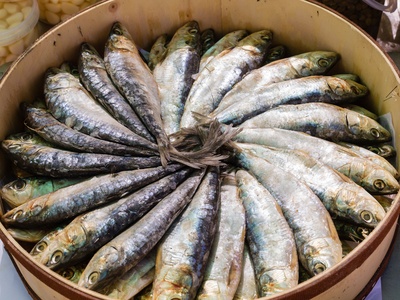
European Pilchard
The cornerstone of the Adriatic fishing industry and a cultural icon. Often grilled fresh or canned, sardines (‘srdela’) are a vital part of the local diet and economy, especially during summer festivals in Dalmatia.
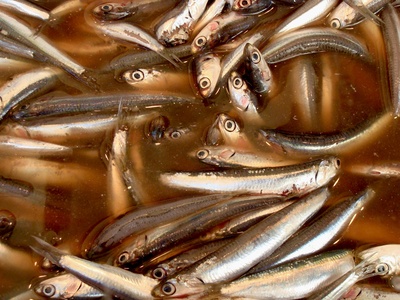
European Anchovy
A small, silvery fish crucial to the Adriatic ecosystem and fishery. It’s the basis for salted and marinated ‘inćuni’, a classic Croatian appetizer. Huge schools are a common sight in coastal waters.
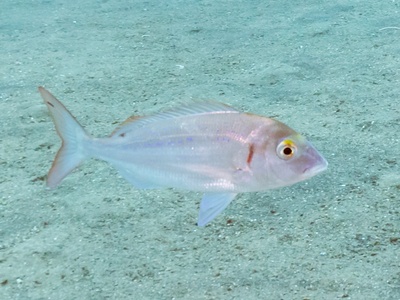
Common Pandora
A popular and tasty pinkish-silver fish, frequently found in fish markets and on restaurant menus. It is a common catch for both professional fishermen and recreational anglers along the entire Croatian coast.
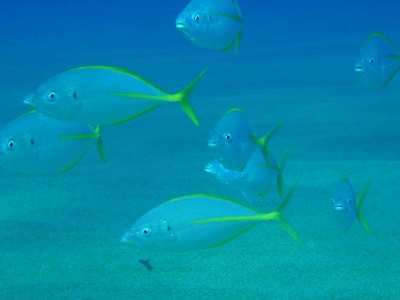
Salema Porgy
Easily identified by its silvery body and distinct golden-orange stripes. It’s a herbivore, often seen grazing in large schools. Eating its head can sometimes cause mild, harmless hallucinations.
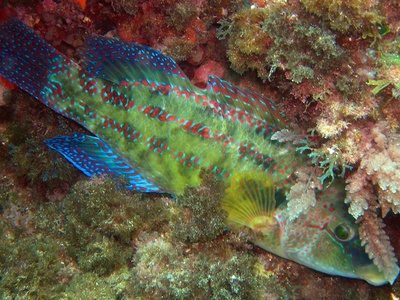
Peacock Wrasse
A colorful and common fish, especially visible in summer. Males display vibrant breeding colors. They are curious and often approach swimmers and divers, making them a familiar sight along the coast.
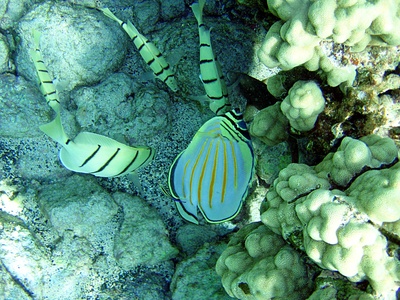
Ornate Wrasse
One of the most colorful fish in the Adriatic, with vibrant turquoise, red, and blue patterns. Its beauty makes it a favorite sight for snorkelers and divers in shallow, sunlit coastal waters.
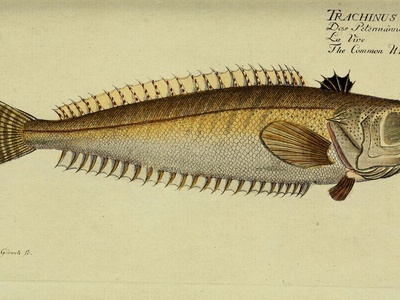
Greater Weever
A bottom-dweller that buries itself in the sand with only its eyes and venomous dorsal fin exposed. A sting is extremely painful, a warning for bathers to shuffle their feet on sandy seabeds.
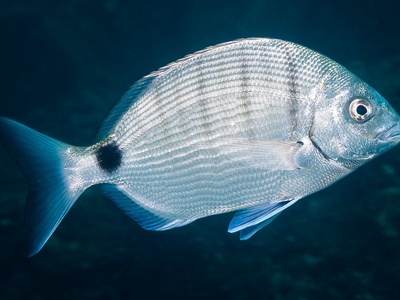
White Seabream
A classic Adriatic fish with a silver body and a distinct black spot on its tail base. It is a prized catch for shore anglers and spearfishers and is highly regarded for its taste.
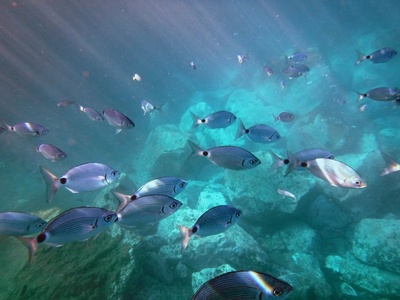
Saddled Seabream
A very common schooling fish, easily recognized by the large black spot encircled in white at the base of its tail. It’s a fun catch for beginner anglers and a constant presence near the coast.
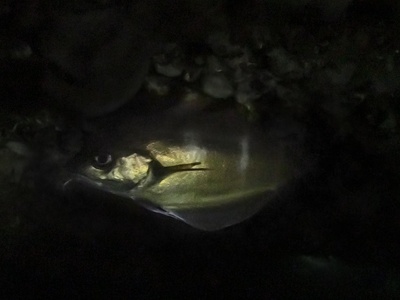
Forkbeard
A nocturnal, bottom-dwelling fish with a distinctive barbel on its chin. It hides in dark crevices during the day. Its white, tender meat is excellent in soups and stews.
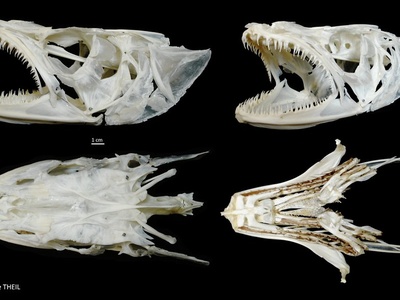
European Hake
A deep-water predator that is one of the most commercially important fish in Croatia. Known as ‘oslić’, its mild, flaky white flesh is incredibly popular and versatile in the kitchen.
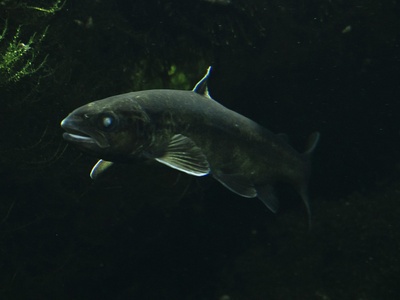
Monkfish
A bizarre-looking anglerfish with a huge mouth and a fleshy lure to attract prey. Despite its monstrous appearance, its tail meat (‘grdobina’) is a boneless, firm delicacy considered a gourmet food.
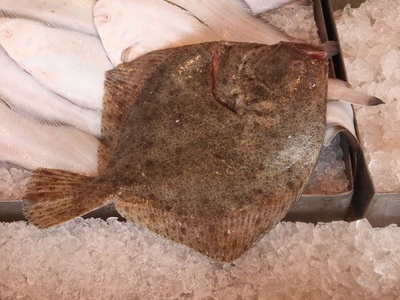
Turbot
A large, circular flatfish that is a master of camouflage. It is a highly prized culinary fish, renowned for its firm, white flesh and delicate flavor, often baked whole with potatoes.
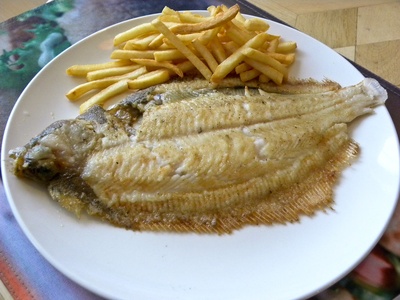
Common Sole
A classic flatfish, known as ‘švoj’ in Croatia. It is highly valued for its fine, delicate flavor and is a favorite in upscale restaurants, often pan-fried or grilled simply with lemon and herbs.
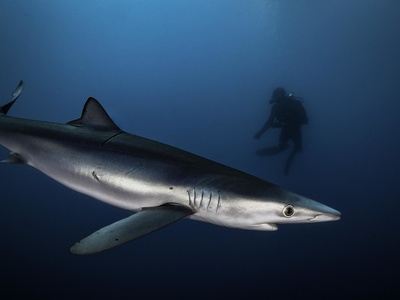
Blue Shark
A slender, elegant shark with a distinct indigo-blue back. It is a highly migratory species found in the deeper, open waters of the Adriatic, though sightings are becoming increasingly rare.
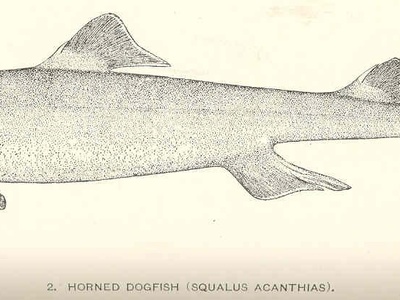
Spiny Dogfish
A small shark species with venomous spines in front of its dorsal fins. It often forms large schools and is sometimes caught as bycatch. Not considered a threat to humans.
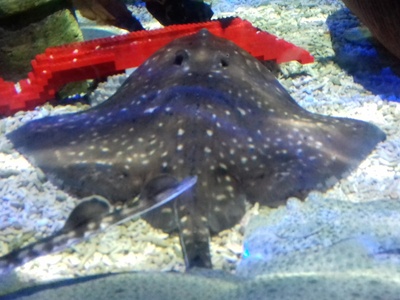
Thornback Ray
A common ray in the Adriatic, identifiable by the large spines or “thorns” on its back and tail. Its “wings” are edible and appreciated for their unique, stringy texture when cooked.
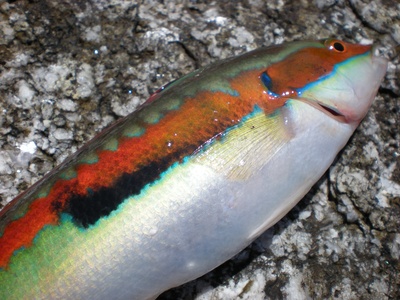
Mediterranean Rainbow Wrasse
A small, vibrant fish that exhibits sexual dimorphism: females are drabber, while males have a striking orange and blue-green pattern with a distinctive zigzag stripe. A jewel for snorkelers.
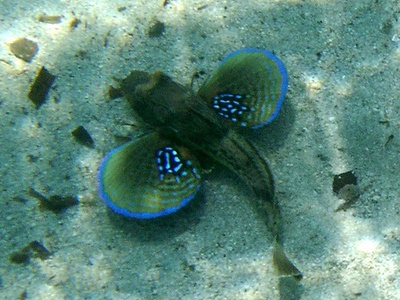
Tub Gurnard
Known for its large, iridescent blue-green pectoral fins that look like wings, which it flashes when threatened. It can “walk” on the seabed using modified fin rays. A unique and tasty fish.

Star-gazer
This fish buries itself in the sand with only its upward-facing eyes and mouth visible, waiting to ambush prey. It has a venomous spine above its pectoral fin, so handle with care.
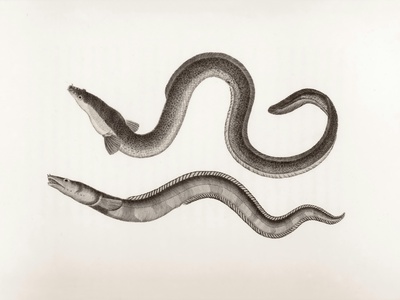
Conger Eel
A large, powerful eel, much bigger than the moray. It is a nocturnal predator. While its meat is bony, it is a key ingredient for the traditional fish stew, brodet, especially in Dalmatia.
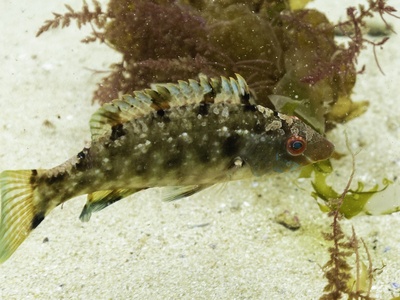
Five-spotted Wrasse
A small, common wrasse often seen building elaborate nests out of algae. It has a distinctive dark spot on its tail base and often another below the dorsal fin.
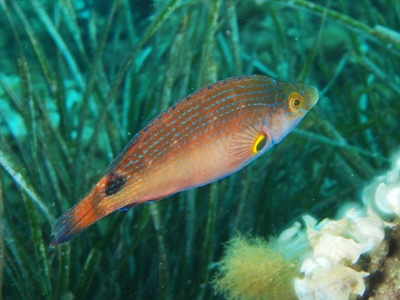
Axillary Wrasse
Identifiable by a small black spot at the base of the pectoral fin and a dark spot on the tail. Males display beautiful blue and red lines on their heads during breeding season.
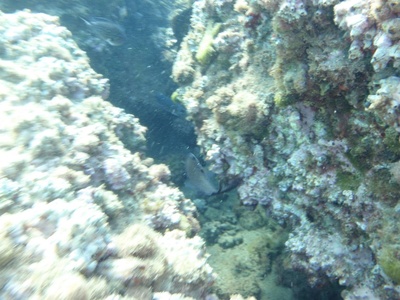
Brown Meagre
A shy, nocturnal fish with a distinctive arched back, often found hovering in small groups in dark, quiet places. It can produce a croaking sound. It is protected in Croatia.
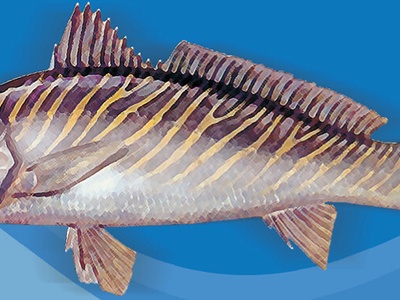
Shi Drum
Recognizable by the short, thick barbel on its chin. It’s a prized game fish, known for its strong fight. It feeds on bottom-dwelling invertebrates, which it detects with its barbel.
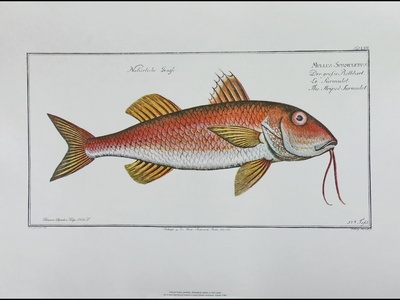
Striped Red Mullet
A delicacy with a rich flavor, highly esteemed since Roman times. It has two long barbels under its chin which it uses to probe the sand for food, stirring up puffs of sediment.
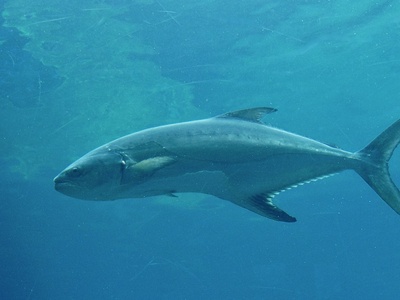
Leerfish
A large, fast, and aggressive predator, often hunting in packs. It’s a formidable opponent for sport anglers, known for its powerful runs and aerial displays when hooked near the coast.
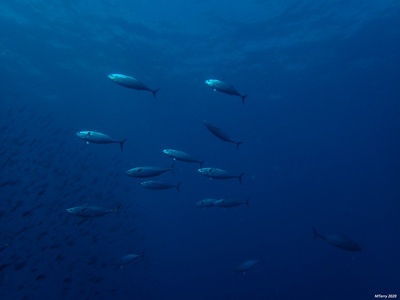
Little Tunny
A smaller member of the tuna family, recognized by the wavy dark markings on its back and spots near its pectoral fin. A strong fighter, popular with sport fishermen.
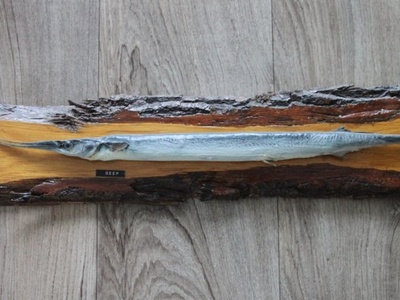
Garfish
A long, slender fish with a needle-like beak and green bones. It often swims near the surface and can be seen leaping out of the water. It is a tasty fish, despite its unusual bone color.
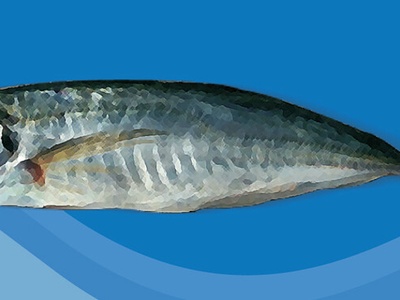
Horse Mackerel
A common and commercially important fish, known as ‘šarun’. It’s characterized by the line of large, bony scales (scutes) along its side. Often grilled or fried whole.
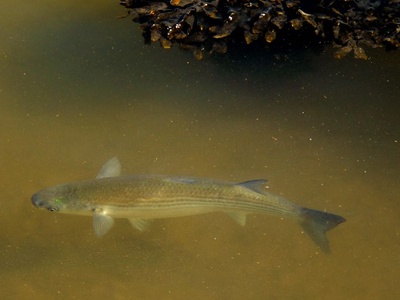
Grey Mullet
A common fish often seen in harbors and river mouths, feeding on detritus. It is known for its habit of leaping out of the water. Its roe is used to make bottarga.
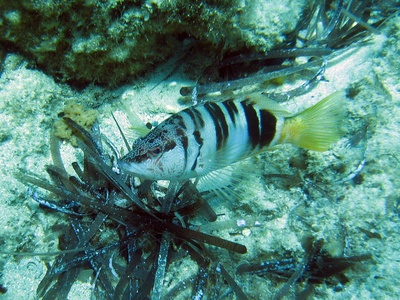
Painted Comber
A small, colorful member of the grouper family with bright blue and orange markings and vertical bars. It is a curious and territorial fish, often seen by divers.
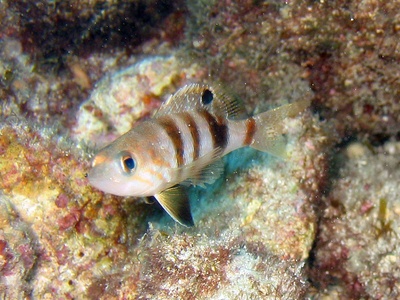
Brown Comber
The smallest and most common of the Adriatic combers. It has a series of dark brown vertical bars and a distinctive large black spot on its dorsal fin.
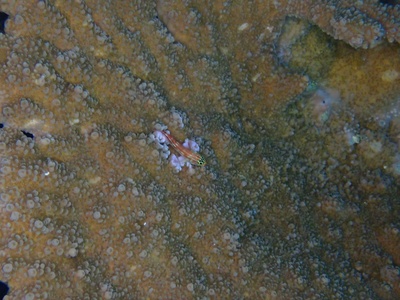
Three-finned Blenny
A tiny, territorial fish where the male turns a brilliant red with a black head during breeding season. A delight for snorkelers and rock pool explorers to spot on sunny rock faces.
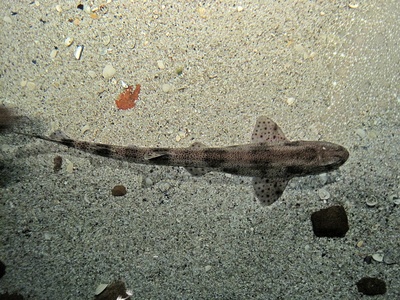
Small-spotted Catshark
A small, harmless bottom-dwelling shark, often called a dogfish. It is nocturnal, spending its days resting on the seabed. Its rough skin was once used as sandpaper.
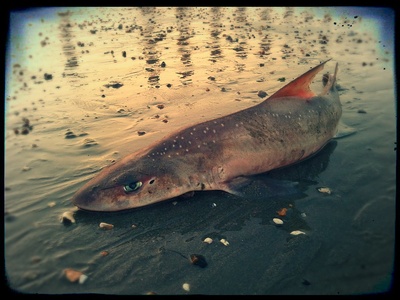
Smooth-hound
A small, slender shark lacking the typical sharp teeth, instead having flattened crushing plates for eating crustaceans. It is harmless to humans and is sometimes sold in markets as ‘pas’.
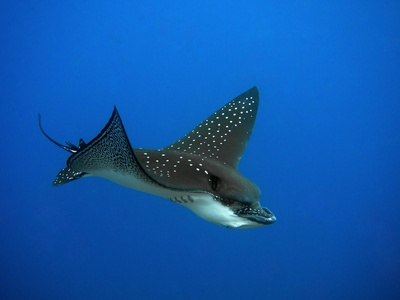
Eagle Ray
A graceful swimmer that appears to “fly” through the water by flapping its large pectoral fins. It has a long, whip-like tail with a venomous spine at the base.
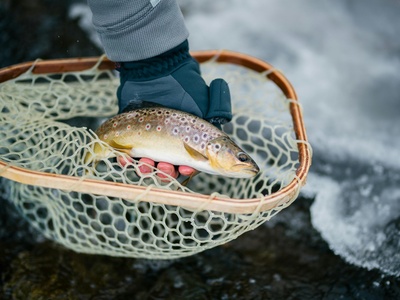
Brown Trout
Croatia’s iconic native freshwater fish, prized by fly-fishermen for its beauty and fighting spirit. Found in pristine karst rivers, where it grows to impressive sizes on a rich crustacean diet.
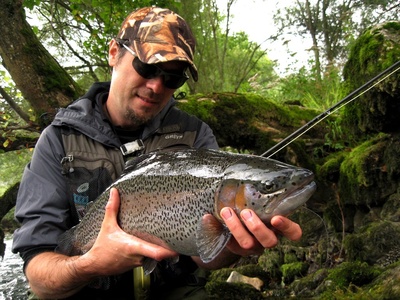
Rainbow Trout
An introduced species from North America, now widespread in Croatian rivers and lakes. It is popular for angling and aquaculture due to its fast growth and strong fight.
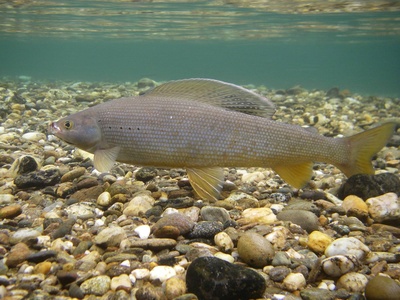
Grayling
A beautiful fish with a large, sail-like dorsal fin, often called the “lady of the stream.” It is highly sensitive to pollution, so its presence indicates excellent water quality. A favorite of fly-fishers.
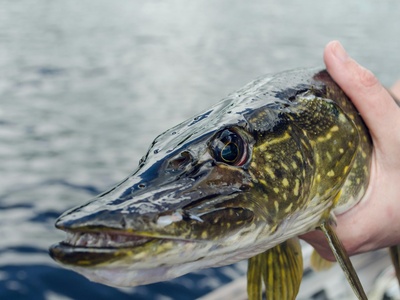
Northern Pike
An ambush predator with a long, torpedo-shaped body and a mouth full of sharp teeth. Known as ‘štuka’, it is a top predator in slow-moving waters and a prized catch for anglers.
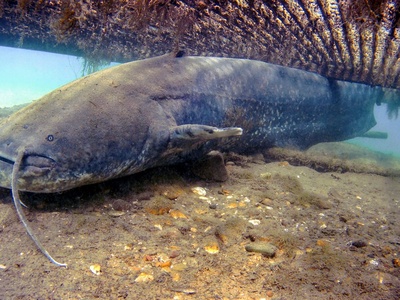
Wels Catfish
Europe’s largest freshwater fish, a massive predator that can grow to enormous sizes. It is a bottom-dweller, active at night. Catching a large specimen is a lifetime achievement for many anglers.
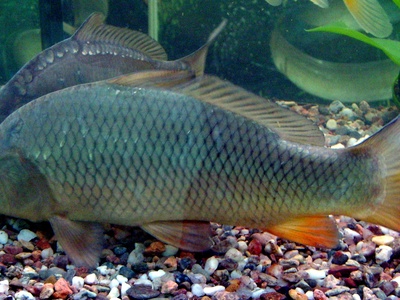
Common Carp
A large, powerful fish, both in its wild and domesticated forms. It’s a very popular target for sport fishing in Croatia, especially in commercial fishing ponds and large rivers like the Sava.
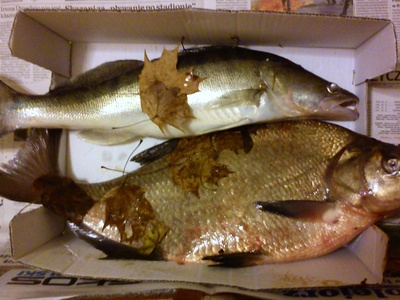
Zander
A predatory fish with vampire-like canine teeth and glassy eyes adapted for low light. It is highly valued for its lean, white, and boneless flesh, making it a popular culinary fish.
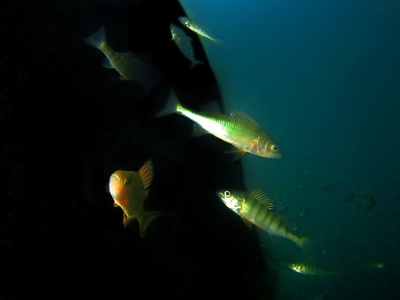
European Perch
A common and easily recognizable fish with a high back, dark vertical stripes, and reddish fins. It is a popular catch for anglers and is known for its tasty meat.
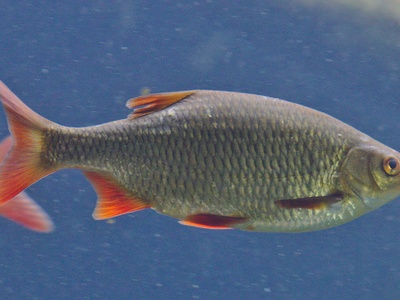
Common Rudd
A beautiful fish with a deep body and bright red fins, often confused with the roach. It commonly feeds near the surface in weedy areas and is a frequent catch for coarse anglers.
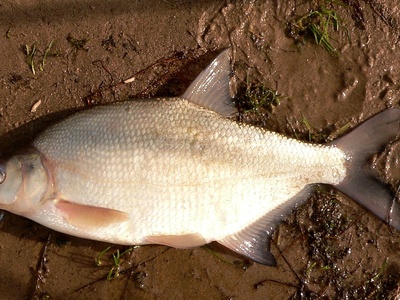
Common Bream
A deep-bodied, silvery fish that often forms large shoals. It is a popular target for coarse anglers who use groundbait to attract the schools. Known for its slimy coating.
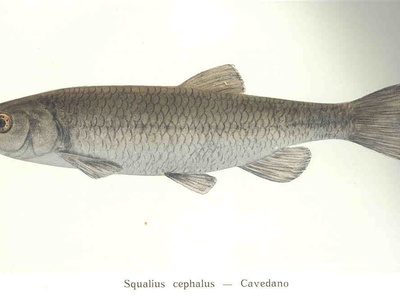
European Chub
A highly adaptable fish found in both fast and slow-moving waters. It is an omnivore with a large mouth, willing to eat almost anything, making it a favorite target for all-round anglers.
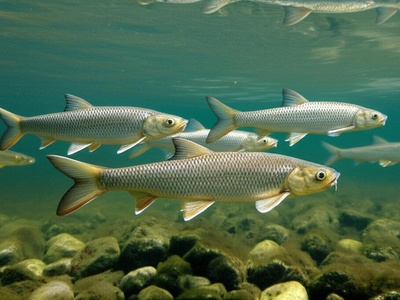
Common Nase
A riverine fish with a distinctive, blunt snout and a hard, straight mouth for scraping algae off rocks. They migrate upstream in large shoals to spawn, a spectacular natural event.
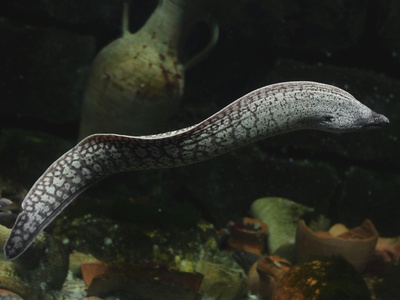
European Eel
A critically endangered fish with a fascinating life cycle, migrating from Croatian rivers to the Sargasso Sea to breed. Its populations have declined dramatically. It’s a delicacy, especially in the Neretva delta.
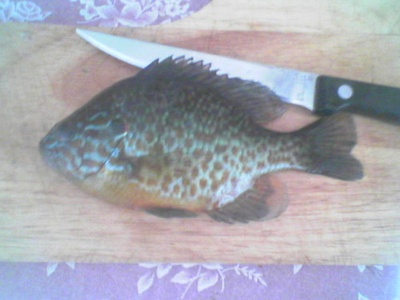
Pumpkinseed
A colorful sunfish introduced from North America. It has become an invasive species in many Croatian waters, outcompeting native fish for food and habitat. Easily caught by young anglers.
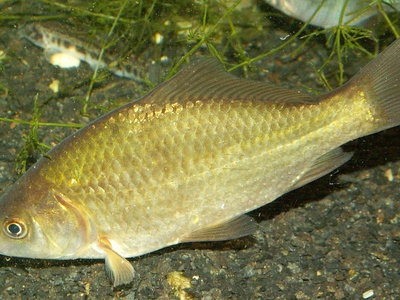
Prussian Carp
A highly resilient and invasive species that can reproduce without males (gynogenesis). It often outcompetes native cyprinids like the crucian carp, and is now abundant in many lowland waters.
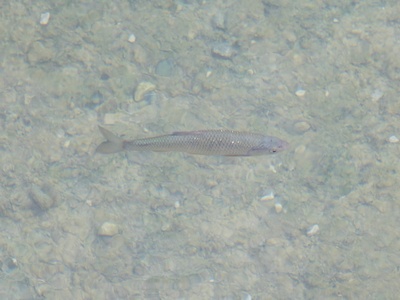
Zrmanja Chub
A fish species endemic to Croatia, found only in a few karst rivers. Its limited range makes it vulnerable to habitat changes and pollution, highlighting the need for conservation of these unique ecosystems.
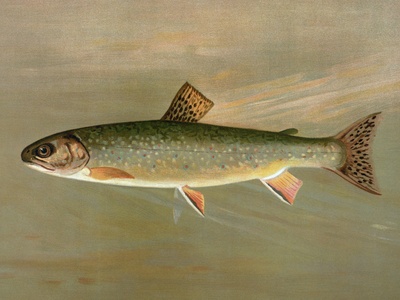
Soft-muzzled Trout
A unique and endangered trout species endemic to the Adriatic river basins. It is characterized by its small, fleshy mouth and is a prized, but protected, species for local fly-fishermen.

Visovac Goby
An extremely rare and critically endangered goby, found only in a very small area within Krka National Park. It is one of Croatia’s most threatened fish, living a secretive life among aquatic plants.
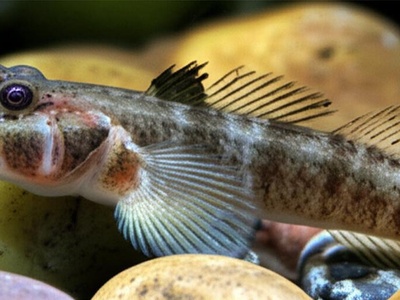
Tuberous Goby
A small Ponto-Caspian goby that has colonized Croatian rivers. It is recognizable by its prominent tubular nostrils. It is considered an invasive species in North America but is native to this region.
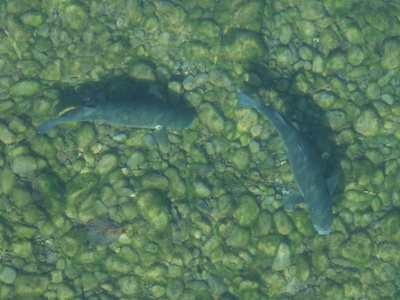
Marbled Trout
A large, predatory trout with a distinctive marbled pattern instead of spots. It is a spectacular native fish of the northern Adriatic river systems, highly sought after by fly anglers for its size and beauty.
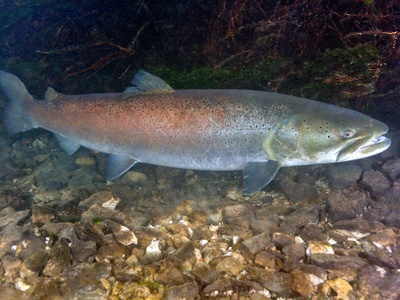
Huchen
Also known as the Danube Salmon, this is one of the largest salmonids in the world. It is a powerful river predator, now endangered and heavily protected. Sighting one is a rare privilege.
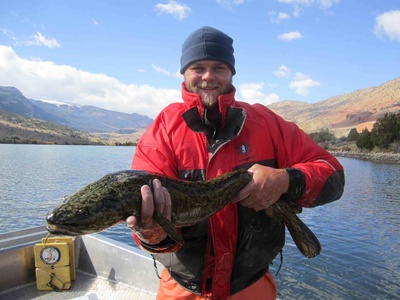
Burbot
The only freshwater member of the cod family. It has a single barbel on its chin and an elongated, eel-like body. It’s a nocturnal, bottom-dwelling fish, active in cold water.
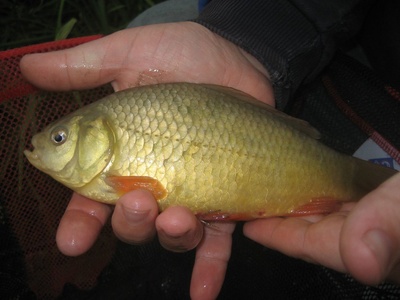
Crucian Carp
A native carp species that is highly resilient to low oxygen levels. It is threatened by hybridization with the invasive Prussian carp. It has a deep, golden body and lacks the barbels of the common carp.
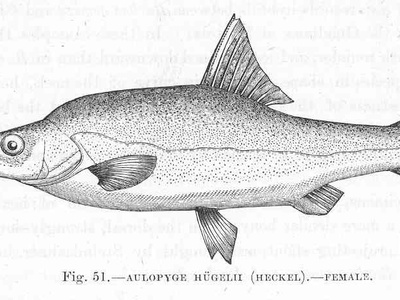
Dalmatian Barbelgudgeon
An endemic and vulnerable species living in the underground streams and surface waters of karst poljes. It has a unique appearance and is a prime example of Croatia’s specialized freshwater fauna.
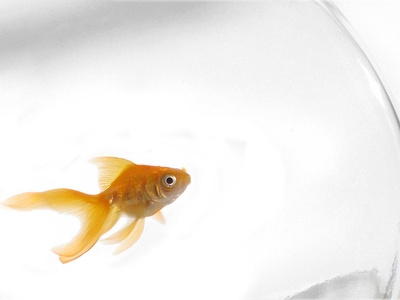
Goldfish
Originally a domesticated species, released goldfish have established wild populations. They can degrade water quality and compete with native species, posing an ecological threat in some enclosed water bodies.
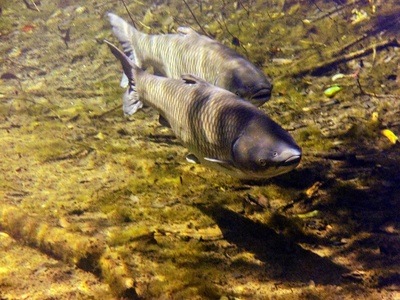
Grass Carp
An Asian carp species introduced to control aquatic vegetation. It can grow to massive sizes. Escaped individuals have established populations in major rivers like the Sava and Drava.
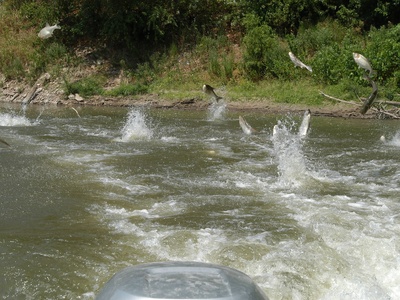
Silver Carp
An invasive filter-feeding carp from Asia. It is known for its alarming habit of leaping high out of the water when startled by boats, posing a physical danger to boaters.
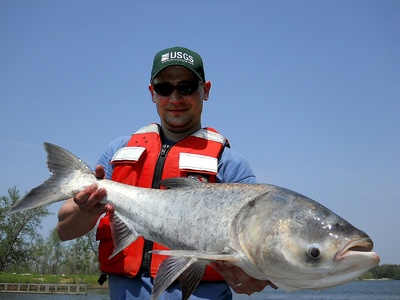
Bighead Carp
Another large, invasive filter-feeding carp from Asia. Along with the silver carp, it competes with native plankton-eating fish and can alter the entire aquatic food web.
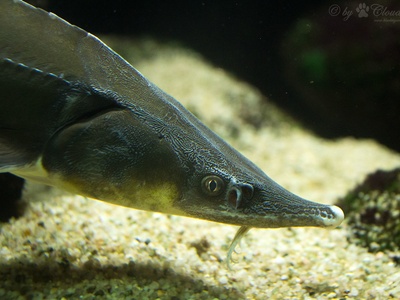
Sterlet
A smaller species of sturgeon, a “living fossil” that lives permanently in freshwater. It is critically endangered due to dam construction and overfishing. It’s prized for its meat and caviar.
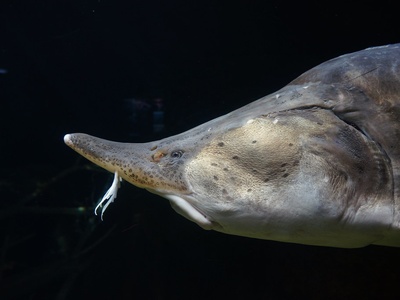
Beluga Sturgeon
The largest freshwater fish in the world, famous for its caviar. It is now considered regionally extinct in the Croatian parts of the Danube basin due to dams blocking its migration routes from the Black Sea.
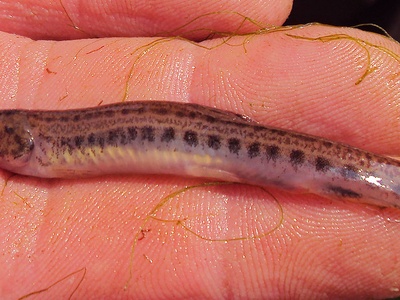
Stone Loach
A small, bottom-dwelling fish with barbels around its mouth. It hides under stones during the day and is an important indicator of good water quality in smaller streams.
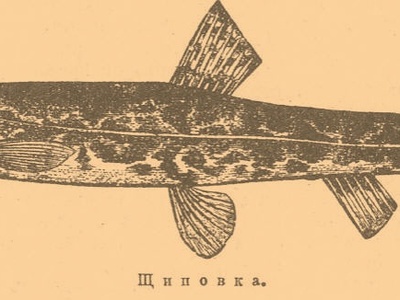
Spined Loach
A small, elongated fish that can breathe air intestinally. It has a tiny, movable spine under each eye which it can erect for defense. It spends most of its time buried in the sand.
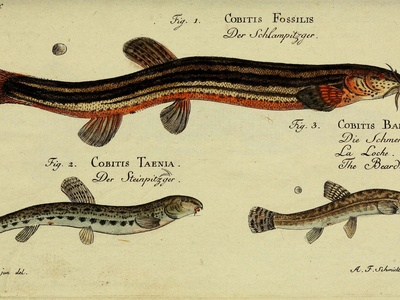
Weatherfish
A long, eel-like loach known for its ability to predict storms. It becomes very active with changes in barometric pressure. It can survive drought by burying itself in mud.
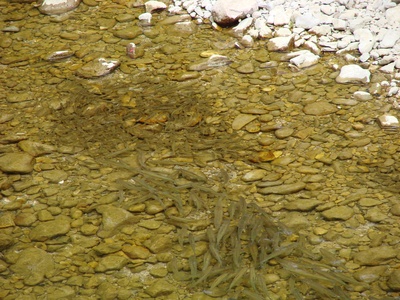
Common Minnow
A small, shoaling fish that is a key part of the riverine food web. Males develop bright red bellies during the spawning season, making for a beautiful sight in shallow streams.
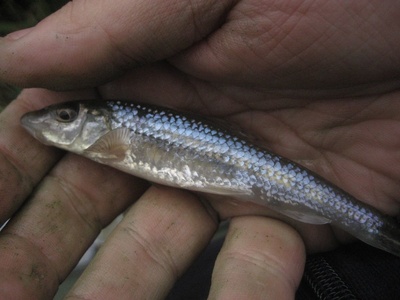
Gudgeon
A small, sociable bottom-feeding fish with two barbels at the corners of its mouth. It is often used as live bait by anglers fishing for predators like perch and zander.
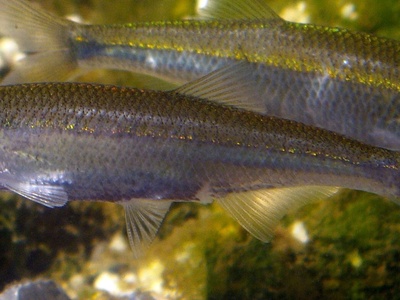
Sunbleak
A small, silvery fish that often swims in shoals close to the surface. It is very tolerant of poor water quality and is sometimes used as a baitfish.
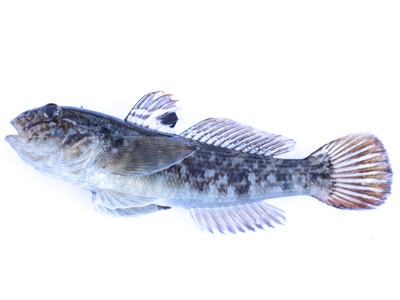
White-finned Gudgeon
A bottom-dwelling gudgeon found in the fast-flowing sections of large rivers. It is distinguished from the common gudgeon by its more slender body and longer barbels.

Asp
A large, predatory cyprinid that hunts other fish in open water, often creating splashing “boils” on the surface. It is a powerful sport fish, appreciated for its aggressive strikes.

Ide
A shoaling fish that can grow quite large. A golden ornamental variety, known as the orfe, is popular in ponds. In the wild, it is a target for coarse anglers.
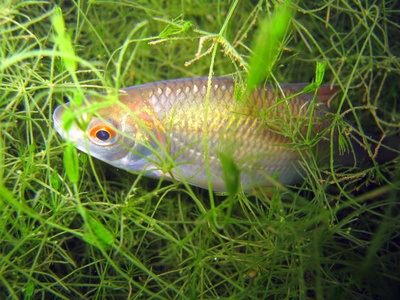
Roach
One of the most common and widespread coarse fish in Croatia. It is easily identified by its silvery body and red eyes and fins. It is a staple catch for many recreational anglers.
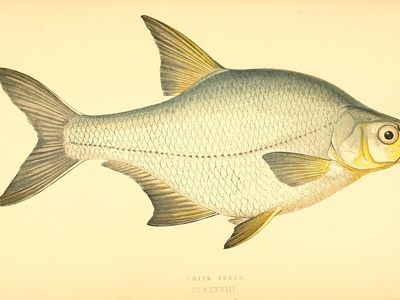
Blicca
Also known as the silver bream, it looks very similar to the common bream but is smaller and has larger eyes. It is very common in the large rivers of the Danube basin.
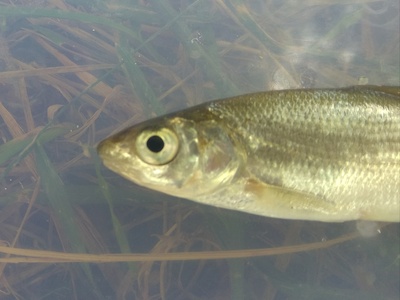
Vimba Bream
Known for its long snout, this fish undertakes long spawning migrations upstream. Outside of the spawning season, it has a plain silvery color, but males develop a dark back and orange belly.
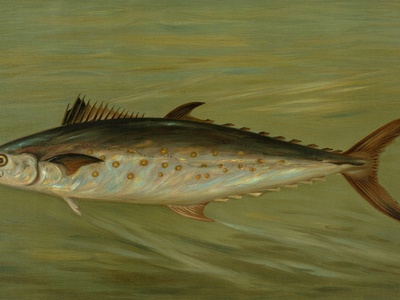
Adriatic Salmon
A native trout species found in the rivers flowing into the Adriatic Sea. It is adapted to the specific conditions of karst rivers and is part of Croatia’s unique ichthyofauna.
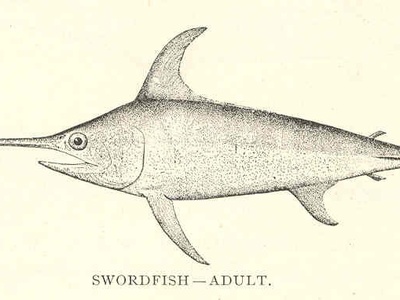
Swordfish
An iconic oceanic predator, known for its long, sword-like bill. While not common, it is a highly prized catch for big-game fishermen in the southern, deeper parts of the Croatian Adriatic.
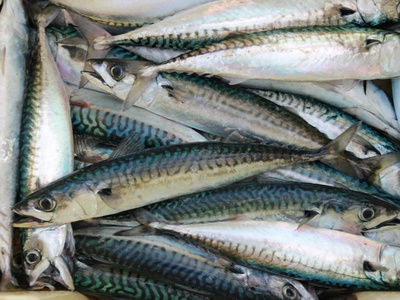
Mackerel
A fast-swimming schooling fish with a distinctive wavy pattern on its back. Known as ‘skuša’ or ‘lokarda’, it is a popular and affordable fish, often grilled or smoked.
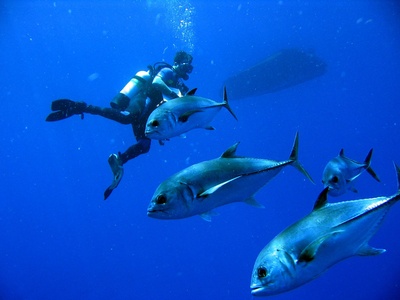
Horse-eye Jack
A species typically found in the Atlantic, its occasional appearance in the Adriatic is a sign of warming sea temperatures. It is a powerful predator, similar in shape to the amberjack.
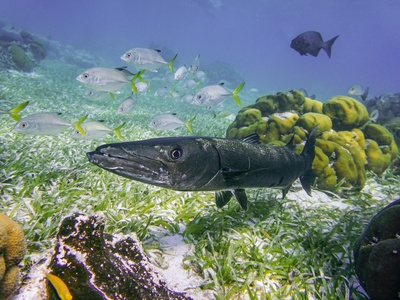
Barracuda
A predatory fish with a menacing look due to its sharp teeth. Sightings have become more common in the Adriatic, likely due to climate change. Divers enjoy seeing them hunt in packs.
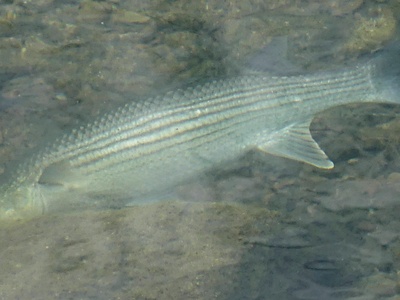
Thicklip Grey Mullet
One of several mullet species in the Adriatic, identified by its thick upper lip. Often seen in schools in marinas and ports, it is an important commercial species.
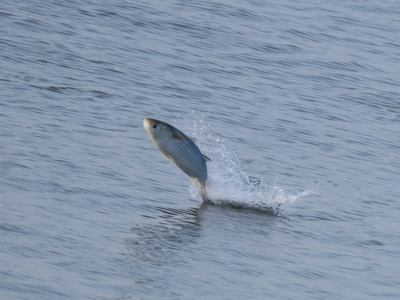
Flathead Grey Mullet
A common mullet species found worldwide in temperate and tropical waters. It is known for leaping out of the water. Its cured roe is a delicacy known as bottarga.
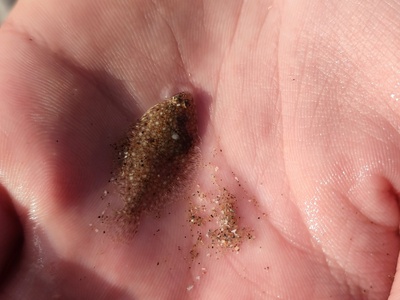
European Flounder
A flatfish that is notable for its tolerance of freshwater, often found in river mouths like the Neretva delta. It is an important commercial species in some parts of Europe.
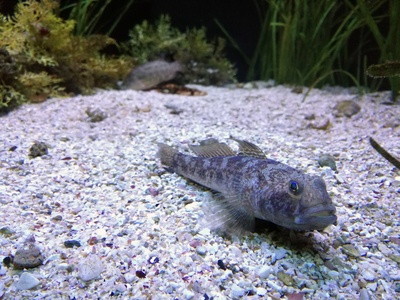
Black Goby
A common goby found on soft bottoms. The male is almost entirely black during the breeding season and will aggressively guard a nest of eggs laid under a shell or stone.
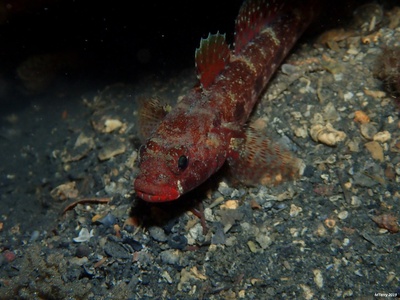
Red-mouthed Goby
A secretive goby easily identified by its blood-red lips and cheeks. It is often found hiding in crevices or under rocks, making it a fun find for observant snorkelers and divers.
